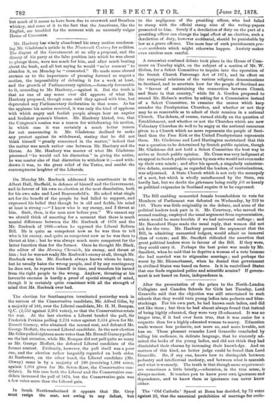Mr. Banbury has wisely abandoned his crazy motion condemn- ing
Mr. Gladstone's article in the Nineteenth Century for sedition. The disgust of the Government at so silly a proposal, and the dismay of his party at the false position into which he was about to plunge them, were too much for him, and after much beating about the bush, and all but saying he would " ne'er consent" to abandon it, on Monday he "consented." He made some absurd excuses as to the importance of pressing forward so urgent a motion, the impossibility of debating it for a week at least, and the growth of Parliamentary opinion,—formerly favourable to it, according to Mr. Hanbury,—against it. But the truth is that no one of any sense ever did approve of what Mr. Banbury proposed, though some said they agreed with him, but deprecated any Parliamentary declaration in that sense. As for the applause his notice received, it was only the kind of applause with which angry and foolish people always hear an angrier and foolisher person's bluster. Mr. Hanbury hinted, too, that the Congress's session was a reason for withdrawing his motion, in which case it was certainly a much better reason for not announcing it. Mr. Gladstone declined to make any protest against its withdrawal, stating that he did not think himself " greatly concerned in the matter," indeed that the matter was much rather one between Mr. Hanbury and the House. As Mr. Hanbury was master of what Mr. Gladstone presumed "he would call his discretion" in giving the notice, he was master also of that discretion to withdraw it ;—and with- drawn it was, to the great relief of the Tories, and amidst the contemptuous laughter of the Liberals.


































 Previous page
Previous page